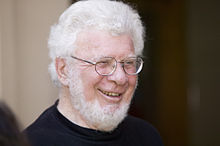Leonard A. Herzenberg
Leonard Arthur "Len" Herzenberg (born November 5, 1931 in New York City , † October 27, 2013 in Stanford , California ) was an American biochemist, geneticist and immunologist. He was a professor at Stanford University . He is known for the invention (1970) of a method of flow cytometry (FACS, fluorescence activated cell sorting), with which marked cells can be sorted at high speed.
Herzenberg graduated from Brooklyn College with a bachelor's degree in biology and chemistry in 1952 and received a PhD in biochemistry and immunology from Caltech in 1955 . As a post-doctoral student he was a fellow of the American Cancer Foundation at the Institut Pasteur in Paris and from 1957 he did research at the National Institutes of Health . From 1959 he was at Stanford University, where he became a professor of genetics. He and his wife Leonore "Lee" Herzenberg ran their own laboratory there.
He also did research on microchimerism and in 1979 found male blood cells in the blood of boys of pregnant women. After a stay with César Milstein, he brought hybridoma technology to the USA at an early stage and developed monoclonal antibodies in his laboratory.
In 1982, Herzenberg was elected to the National Academy of Sciences . In 2006 he received the Kyoto Prize .
His daughter Jana Herzen is a singer-songwriter and founder of Motéma Records.
literature
- Mario Roederer: Leonard Herzenberg (1931-2013). In: Nature . Volume 504, No. 7478, 2013, p. 34, doi: 10.1038 / 504034a
Web links
- Herzberg laboratory
- Old homepage in Stanford ( Memento from March 19, 2005 in the Internet Archive )
- Obituary by Mario Roederer
| personal data | |
|---|---|
| SURNAME | Herzberg, Leonard |
| ALTERNATIVE NAMES | Herzberg, Leonard Arthur; Herzberg, Len |
| BRIEF DESCRIPTION | American biochemist and immunologist |
| DATE OF BIRTH | November 5, 1931 |
| PLACE OF BIRTH | New York City |
| DATE OF DEATH | October 27, 2013 |
| Place of death | Stanford (California) |
